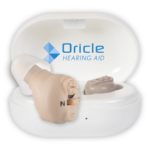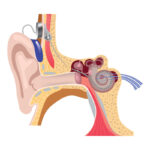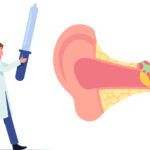Overcoming the Dual Challenge of Tinnitus and Sinusitis
Tinnitus and sinusitis are two very common medical conditions that affect a large percentage of the population. Tinnitus, or ringing in the ears, can be a very frustrating and sometimes debilitating condition that can negatively impact one's quality of life. Sinusitis, or inflammation of the sinuses, can also be quite uncomfortable and can cause a range of symptoms including nasal congestion, headaches, and pressure in the face.
While these two conditions may seem unrelated, they can actually be connected in some cases. In this blog post, we will discuss the relationship between tinnitus and sinusitis and what you can do to manage both conditions.
Understanding Tinnitus
Tinnitus is a medical condition that is characterized by the perception of sound in the ears or head that is not actually present in the environment. This sound can take many different forms, including ringing, buzzing, humming, hissing, or clicking. Tinnitus can be temporary or chronic, and it can be caused by a variety of factors including exposure to loud noise, certain medications, ear infections, and hearing loss.
Understanding Sinusitis
Sinusitis, also known as a sinus infection, is a condition that is caused by inflammation of the sinuses. The sinuses are air-filled cavities located in the skull that are connected to the nasal passages. When the sinuses become inflamed, they can become blocked, leading to a buildup of mucus and pressure. This can cause a range of symptoms, including nasal congestion, headaches, facial pain or pressure, and a decreased sense of smell.
The Connection Between Tinnitus and Sinusitis
While tinnitus and sinusitis may seem like unrelated conditions, they can actually be connected in some cases. When the sinuses become inflamed and blocked, they can put pressure on the ears and affect the functioning of the auditory system. This can lead to symptoms of tinnitus such as ringing or buzzing in the ears. Additionally, some medications that are used to treat sinusitis can also cause tinnitus as a side effect.
Caffeine

Although coffee and tea have long been thought to contribute to tinnitus, research on the effect of caffeine has been scarce. One study conducted in 1991 included 65,085 women, who were free of tinnitus at baseline, and collected data on diet and beverage intake every two years. The third study was conducted in 2009 and included more than 6,000 women without tinnitus. Participants were asked to rate the frequency of tinnitus and its severity. The researchers defined incident tinnitus as tinnitus that was present daily or more frequent than once per month.
While there is no conclusive proof of whether caffeine affects tinnitus symptoms in some people, it has been suggested that it can help relieve the discomfort of ringing in the ears. While it's difficult to determine exactly how caffeine affects the ear, it does have a direct effect on the inner ear. Caffeine stretches the outer hair cells, causing the hairs to shorten. The effects of caffeine may be mediated by calcium releases from ryanodine receptors. It may also help protect from incident tinnitus.
Research on the connection between caffeine and hearing health is sparse, but it is possible that caffeine intake may affect the incidence of tinnitus and sinusitis in men. However, further research is needed to determine if caffeine intake can affect the occurrence of Meniere's disease and sinusitis. There is a connection between caffeine intake and the risk of hearing disorders.
Allergies
Inflammation in the air can cause a number of symptoms including hearing loss, conductive hearing loss, and ringing in the ears. Inflammation can also impact sound waves that vibrate the middle ear bones and cause hearing loss. Allergies and sinusitis are common causes of tinnitus, but they are not the only cause. Your doctor will be able to identify the exact cause of your ringing.
Hay fever and allergic rhinitis can cause ear problems during seasonal changes. However, year-round exposure to airborne allergens can cause chronic ear problems. This condition causes abnormal pressure in the sinuses, causing excess mucus to build up. The buildup can irritate the eardrums and lead to a heightened sense of tinnitus.
Your doctor can determine whether you are allergic to certain substances or allergens. He may recommend allergy testing or allergy shots to help avoid the triggers. If you suspect you may have a serious allergic reaction, an ENT specialist will be able to determine the best treatment for you. If symptoms persist after undergoing allergy testing, you may consider contacting an allergist. He can create a comprehensive plan to treat your underlying allergies.
Allergies and sinusitis are two common causes of tinnitus. Both of these conditions result in inflammation of the airways, resulting in nasal congestion, itchiness, and excess mucus production. Because of this, allergy sufferers should seek medical treatment immediately. They can even be suffering from hearing loss. The best treatment option for allergies is prescription medication.
Cold

While cold, sinusitis, and tinnitus are often related, there is an important difference between the two. Sinus infection is a common cause of ringing in the ears, while tinnitus is caused by an underlying vascular problem. Unlike sinusitis, which is often difficult to diagnose, tinnitus is usually treated with a variety of medications.
When a person has a cold, he or she may experience ringing in the ears due to mucus in the nasal passages. When a person has a sinus infection, the mucus and pressure in the nose and sinuses affect hearing and may even cause tinnitus. If you suspect you have a cold, you should visit a doctor. Treatment for sinus infection involves taking medicine and using nasal rinses. These medications may be helpful in alleviating the ringing in the ears, but they do not cure the underlying condition.
Chronic sinusitis is caused by recurring episodes of acute or chronic sinusitis. This type of infection can persist for months or even years. If not treated, it can lead to other serious complications, including infections in the bones and tissue surrounding the sinuses and the fluid that surrounds the brain. It will also leave you very ill and your breath will be unclean. So if you suffer from chronic sinusitis, see your doctor as soon as possible.
Flu
Flu symptoms include sinusitis and tinning of the ears. Sinuses are hollow spaces in the bones of the face, and they usually produce mucus. When the sinuses become infected, they swell and create an excessive amount of mucus. The symptoms of sinusitis often worsen when a person contracts a cold. People with allergies are more likely to develop sinusitis.
Symptoms of sinusitis are usually caused by a virus or bacteria that inflames the nasal passages. These symptoms include mucus buildup and congestion. These symptoms can also affect hearing, and a sinus infection is not difficult to treat. Treatment options for sinusitis include medicine or nasal rinses. The use of nasal sprays can reduce mucus and pressure, and may also help treat tinnitus.
Inflammation of the ear canal can also cause tinnitus. The auditory nerve receives electrical signals from sound waves and then transmits them to the brain. These signals are interpreted by the brain as sound, and damage to the hairs in the ear can lead to a ringing or hissing noise. Other ear problems may also contribute to tinnitus, and treatments include retraining therapy and masking the symptoms.
Sinusitis
People who have chronic sinusitis and tinnitus may also experience tooth pain, bad breath, and fatigue. Nasal congestion can accelerate hearing loss and disrupt the normal hearing. In severe cases, this inflammation may even lead to a permanent loss of hearing. In such cases, sinus surgery may be required to cure the problem and eliminate tinnitus. However, if you are experiencing tinnitus, you may want to talk to a medical professional.
Sinusitis and tinnitus are caused by swelling of the sinuses and can cause a buzzing sound. However, treatment is tricky due to the high sensitivity of the body to allergens in the air. Although antibiotics and nasal decongestants can relieve symptoms, these medications may not be enough. You may need to avoid areas that have a high concentration of allergens.
In some cases, temporary tinnitus may be caused by allergies. These issues will cause your ears to fill with mucus, which can irritate your sinuses. This congestion may also cause ear infections. As the Eustachian tube connects the middle and outer ear, nasal congestion can block the passageway and cause ear infections. A blocked Eustachian tube can result in a buildup of mucus and increase the pressure on the eardrum.
In addition to medications, your doctor can prescribe a hearing aid or other device to help you drown out the tinnitus. These devices, like hearing aids, deliver soothing sounds to your ears, allowing you to concentrate on your daily activities. If these methods don't work, consider visiting Sinus & Allergy Wellness Center. They specialize in treating sinus conditions and tinnitus.
Noise-induced hearing loss
There are many risk factors for noise-induced hearing loss, but a single traumatic experience or repeated exposure to loud sounds can lead to this problem. People who frequently use loud machinery or spend time at sporting events or concerts may be at risk for noise-induced hearing loss. Loud noises may even cause permanent damage to the ear's hearing if the loud noises are repeated often.
Other causes of tinnitus include excessive earwax buildup, which can affect the balance of the inner ear and block outside sounds. Other medications that affect hearing include certain ototoxic drugs, which alter the signaling activity of the auditory cortex. This part of the brain processes sounds and communicates with the limbic region, which regulates mood.
Treatments for noise-induced hearing loss may involve a combination of different methods, including earplugs, earplugs, and noise-canceling devices. ENT specialists may recommend certain types of treatment, such as removing excess wax from the ear canal or treating excess middle ear fluid. In some extreme cases, a patient may need surgery to fix the underlying cause.
Many factors can contribute to tinnitus, including head or neck trauma. In addition to head trauma, medications that cause damage to the ear may also be a cause of tinnitus. In addition to prolonged exposure to loud noise, a patient with sinusitis may also have a weakened immune system, which can contribute to tinnitus.
Conclusion
Tinnitus and sinusitis are two common medical conditions that can be frustrating and uncomfortable to deal with. While these conditions may seem unrelated, they can actually be connected in some cases. If you are suffering from both tinnitus and sinusitis, there are a number of things that you can do to manage both conditions. By treating your sinusitis, managing your tinnitus, addressing the root cause, and consulting with a healthcare professional, you can improve your symptoms and get back to feeling like yourself again.
It is important to note that there are many different factors that can contribute to tinnitus and sinusitis, and the best treatment plan will depend on the underlying cause of these conditions. Therefore, it is important to work with a healthcare professional to develop a personalized treatment plan that addresses your specific needs.
Sources
- American Academy of Otolaryngology-Head and Neck Surgery. Sinusitis. https://www.enthealth.org/conditions/sinusitis/
- Mayo Clinic. Tinnitus. https://www.mayoclinic.org/diseases-conditions/tinnitus/symptoms-causes/syc-20350156







